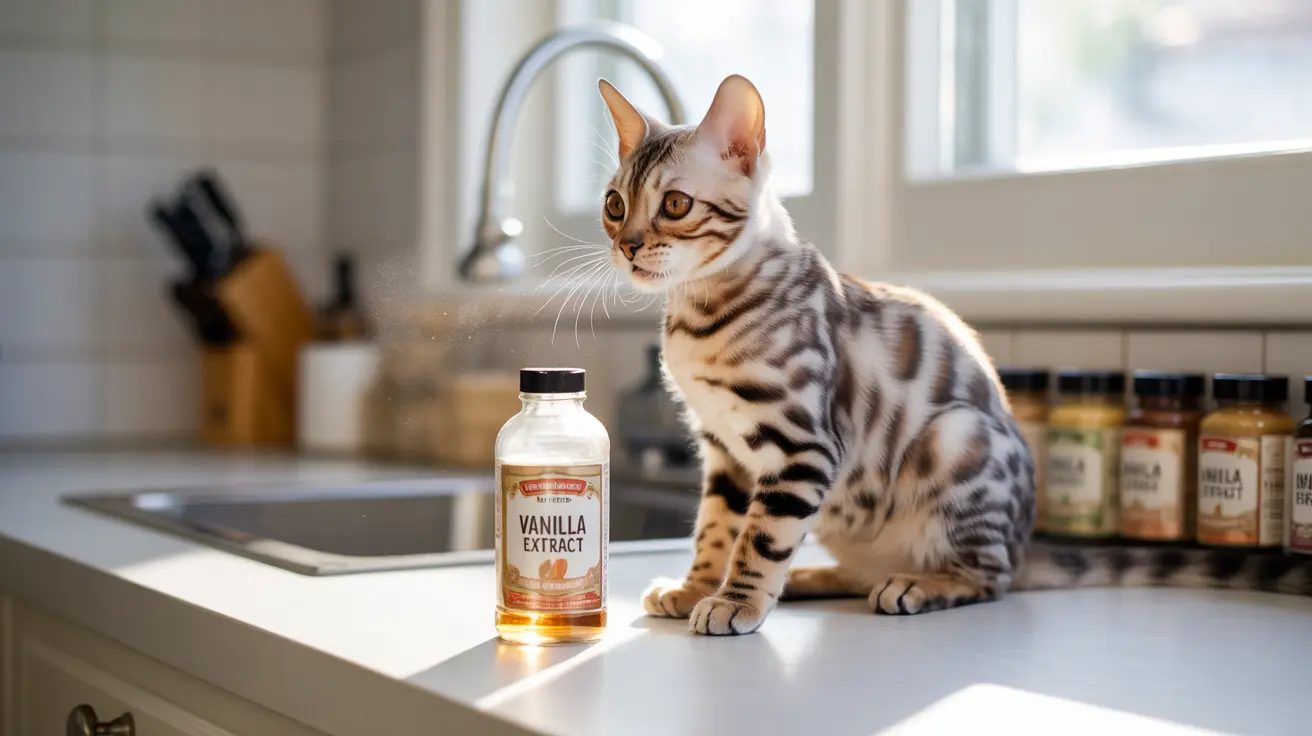Many cat owners wonder about the safety of vanilla for their feline friends, especially given how common this flavoring is in household products. While natural vanilla beans aren't directly toxic to cats, the way vanilla is typically used and prepared can pose serious risks to your pet's health.
Understanding the different forms of vanilla and their potential dangers is crucial for keeping your cat safe. Let's explore everything you need to know about cats and vanilla products, from extracts to ice cream.
Understanding Vanilla Safety for Cats
Natural vanilla beans themselves aren't toxic to cats, but this doesn't mean vanilla is safe for feline consumption. Cats are obligate carnivores with specialized digestive systems that aren't designed to process flavoring agents like vanilla, regardless of their form.
The biggest concerns come from the various ways vanilla is commonly prepared and used in households:
Vanilla Extract and Alcohol Content
Vanilla extract poses the most significant risk to cats due to its high alcohol content, typically 35% or higher. Even a small amount of alcohol can be dangerous for cats, potentially causing:
- Severe disorientation
- Weakness and lethargy
- Dangerous drops in blood sugar
- Seizures in serious cases
- Potential organ failure
Vanilla-Flavored Foods and Dairy Products
Products like vanilla ice cream and yogurt present multiple health risks to cats:
- Most cats are lactose intolerant
- High sugar content can lead to obesity and diabetes
- Artificial sweeteners may be toxic
- Fat content can trigger pancreatitis
The Dangers of Vanilla Essential Oils
Vanilla essential oils are particularly hazardous for cats because:
- Cats lack essential enzymes to process concentrated oils
- Even inhaled oils can cause toxicity
- Grooming after skin contact increases poisoning risk
- Symptoms can include respiratory distress and neurological issues
What to Do If Your Cat Consumes Vanilla
If your cat has ingested any vanilla products, take these steps:
- Identify what was consumed and how much
- Monitor for immediate symptoms
- Contact your veterinarian or pet poison hotline
- Keep product packaging for reference
- Don't induce vomiting without veterinary guidance
Safe Alternatives to Vanilla Treats
Instead of vanilla-flavored products, consider these safe options:
- Commercial cat treats specifically formulated for felines
- Small pieces of plain, cooked meat
- Cat grass or catnip for enrichment
- Veterinarian-approved dental treats
Frequently Asked Questions
Is vanilla toxic to cats, and what are the risks of consuming vanilla products?
While pure vanilla beans aren't toxic, most vanilla products are dangerous for cats due to alcohol content, artificial sweeteners, or other harmful ingredients. The risks range from digestive upset to serious poisoning, especially with vanilla extract or essential oils.
Can cats eat vanilla ice cream safely, or does it pose health risks?
Vanilla ice cream is not safe for cats. Most cats are lactose intolerant, and ice cream contains high levels of sugar and fat that can lead to obesity, diabetes, and digestive issues.
How do I keep my cat safe from vanilla extracts and essential oils?
Store all vanilla products in sealed containers in cabinets your cat can't access. Never leave vanilla extract or essential oils open, and keep scented products out of reach. Be careful with diffusers and topical products containing vanilla.
What happens if my cat accidentally ingests vanilla extract or vanilla essential oil?
Contact your veterinarian immediately. Symptoms may include vomiting, lethargy, difficulty breathing, and neurological issues. The alcohol in extract and concentrated oils can be particularly dangerous.
Can cats have vanilla-flavored treats, or are there safer alternatives for enriching their diet?
Avoid vanilla-flavored treats and stick to commercial cat treats specifically formulated for felines. Better alternatives include cat-specific treats, catnip, or small pieces of plain cooked meat as occasional rewards.
Conclusion
While natural vanilla itself isn't toxic, the forms commonly found in households pose significant risks to cats. From alcohol-based extracts to dairy-heavy ice cream, vanilla products offer no nutritional benefits and can cause serious health issues. Keep your cat safe by storing vanilla products securely and choosing cat-specific treats instead.






